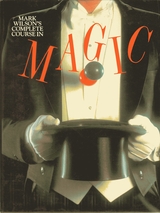
Mark Wilson's Complete Course In Magic
Encyclopedia
Mark Wilson's Complete Course in Magic is the title of a book on magic written by Mark Wilson, the stage magician
.
The book is a popular reference for magicians and has been in print since its first issue in 1975.
The book is organized into sections; each devoted to a particular topic, as follows:
Each trick is divided into logical sub-sections:
Mark Wilson (magician)
James "Mark" Wilson is an American magician and author. He is widely credited as becoming the first major "television magician" and in the process establishing the viability of illusion shows as a television format.-Early years:...
.
The book is a popular reference for magicians and has been in print since its first issue in 1975.
Description of Mark Wilson's Complete Course in Magic
- This description is based on the 1988 edition.
The book is organized into sections; each devoted to a particular topic, as follows:
Introductory sections
- Table of Contents
- Listing of all sections and effects with page numbers.
- This volume contains no index.
- Dedication
- Introductory Letter
- Mark Wilson addresses his reader as "Dear Student," and expounds on his views of the basics of performance magicMagic (illusion)Magic is a performing art that entertains audiences by staging tricks or creating illusions of seemingly impossible or supernatural feats using natural means...
. - Throughout, Wilson refers to illusions as "tricks."
- Mark Wilson addresses his reader as "Dear Student," and expounds on his views of the basics of performance magic
Biographies
- Mark Wilson
- Nani Darnell WilsonNani DarnellNani Darnell is the wife and assistant of American magician Mark Wilson. As Wilson's co-star throughout his television magic career, Darnell heavily influenced public perceptions of magicians' assistants....
(his wife and partner on stage) - Greg Wilson (their son)
- Nani Darnell Wilson
- Walter Gibson, co-author
- U.F. "Gen" Grant, co-author
- Larry Anderson, co-author
- Rakesh Menon, Budding Magician
Practice Makes Perfect
"Three rules are often given as the key to attaining perfection in any art. They are: Practice, more Practice, and still more Practice." (p. 15)Illusions (Tricks)
The main body of the book comprises tricks (Wilson's term) and prerequisite techniques and skills required to perform them. The key elements are illustrated with line drawings and explained in detail in the accompanying text.Each trick is divided into logical sub-sections:
- Effect
- What the audience is intended to see
- Secret and Preparation
- Setting up the props, and how they work.
- Method
- How the performer achieves the effect, step by step.
- Comments and Suggestions
- Tips, pointers, and hard-won experience from the authors.
Card Magic
The section on card effects is divided into classes of tricks; each class contains multiple individual techniques and tricks, as follows:Money Magic
As with Card Magic, the section on money effects is divided into classes of tricks; each class comprises multiple individual techniques and tricks, as follows:- Money Magic
- Money Magic — Bills

